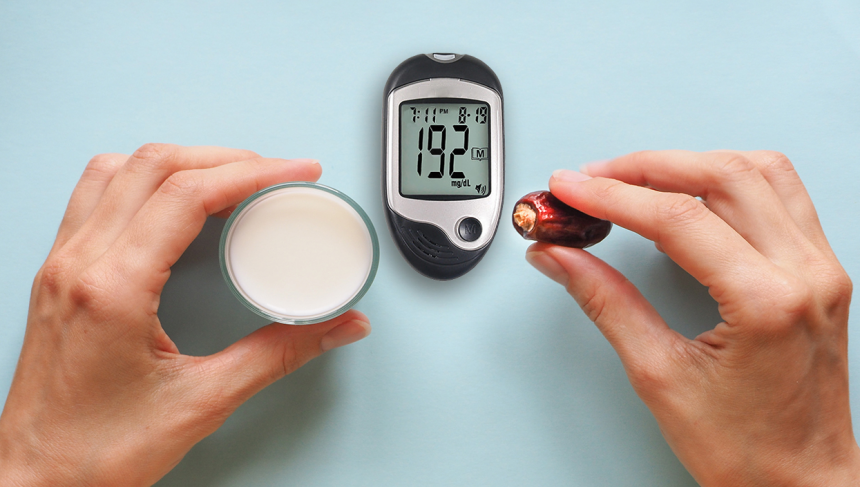RAMADAN AND DIABETES
Ramadan, the holy month of fasting, holds profound spiritual significance for Muslims worldwide. For individuals with diabetes, this period also presents an opportunity to enhance their physical well-being through disciplined fasting and lifestyle modifications. Recent studies suggest that, with proper management, fasting can be beneficial for diabetic patients, leading to improved glycemic control, better cardiovascular health, and weight management. However, careful planning and adherence to medical guidance are essential to ensure safe fasting.
Health Benefits of Fasting for Diabetic Patients
- Improved Glycemic Control: Several studies indicate that Ramadan fasting can lead to reductions in blood glucose levels and HbA1c, which are markers of long-term blood sugar control. This effect is more pronounced when fasting is complemented with a well-balanced diet and appropriate medication adjustments.
- Cardiovascular Benefits: Research shows that fasting has positive effects on heart health by reducing blood pressure and improving lipid profiles. Studies conducted in the Middle East and South Asia, including Kashmir, highlight that Ramadan fasting is associated with reduced total cholesterol and increased HDL-C (good cholesterol), lowering the risk of cardiovascular disease.
- Weight Management: Many individuals experience modest weight loss during Ramadan, which can enhance insulin sensitivity and overall diabetes management. However, maintaining a healthy diet is crucial, as excessive intake of sugary and fatty foods during Iftar can negate these benefits.
Guidelines for Diabetic Patients during Ramadan
- Pre-Ramadan Medical Consultation: Before beginning the fast, diabetic patients must consult their healthcare providers. Physicians can assess their health status, adjust medications, and determine if fasting is safe. Those on insulin or multiple medications need careful monitoring.
- Balanced Nutrition for Suhoor and Iftar: Suhoor (Pre-dawn Meal): It is advisable to consume complex carbohydrates, fiber-rich foods, and proteins to sustain energy levels throughout the day. Whole grains, legumes, eggs, and dairy products are excellent choices. Avoid high-sugar and high-salt foods, which can lead to dehydration. Iftar (Evening Meal): Breaking the fast with dates and water is a traditional practice. However, moderation is key, as dates have natural sugars that can raise blood glucose levels. A well-balanced meal, including lean proteins, healthy fats, and vegetables, should follow to prevent post-meal hyperglycemia.
- Hydration and Blood Sugar Monitoring: Ensuring sufficient water intake during non-fasting hours is essential to prevent dehydration. Diabetic patients should consume water at intervals and include hydrating foods like cucumbers, tomatoes, and watermelon in their meals. Regular blood glucose monitoring is also crucial to detect hypo- or hyperglycemia early and take necessary precautions.
- Medication Adjustments: Adjusting oral antidiabetic medications or insulin doses is necessary for patients fasting during Ramadan. Physicians recommend modifying dosages to prevent sudden drops in blood sugar levels. Delayed-release or long-acting insulin may be preferable to ensure stable glucose levels.
- Physical Activity and Exercise: Engaging in light to moderate exercise is beneficial for diabetic patients. However, strenuous activities during fasting hours should be avoided to prevent energy depletion. Walking after Iftar or light stretching exercises are recommended for maintaining physical fitness.
Conclusion
For diabetic patients in Kashmir, Ramadan is not just a time for spiritual devotion but also an opportunity to adopt healthier habits. By consulting medical professionals, maintaining a balanced diet, staying hydrated, and monitoring blood sugar levels, individuals with diabetes can fast safely while improving their overall health. With proper management, the benefits of fasting can extend beyond Ramadan, contributing to long-term wellness and a more disciplined lifestyle.
In this holy, the key takeaway for diabetic patients is to prioritize health while embracing the spiritual essence of Ramadan. Following expert guidelines and making mindful dietary choices will ensure a rewarding and healthy fasting experience.
Insights from Kashmiri Healthcare Professionals
(The author is a media expert, filmmaker, and social worker. He is currently serving in Media Advocacy and Public Relations in the Department of Rural Development and Panchayati Raj, J&K, where he plays a pivotal role in strategic information, communication and public engagement. Feedback: [email protected])








